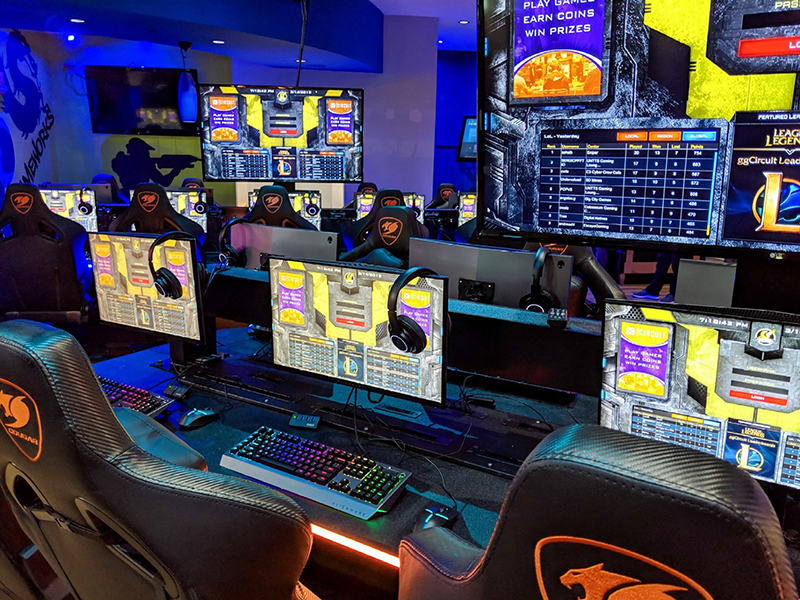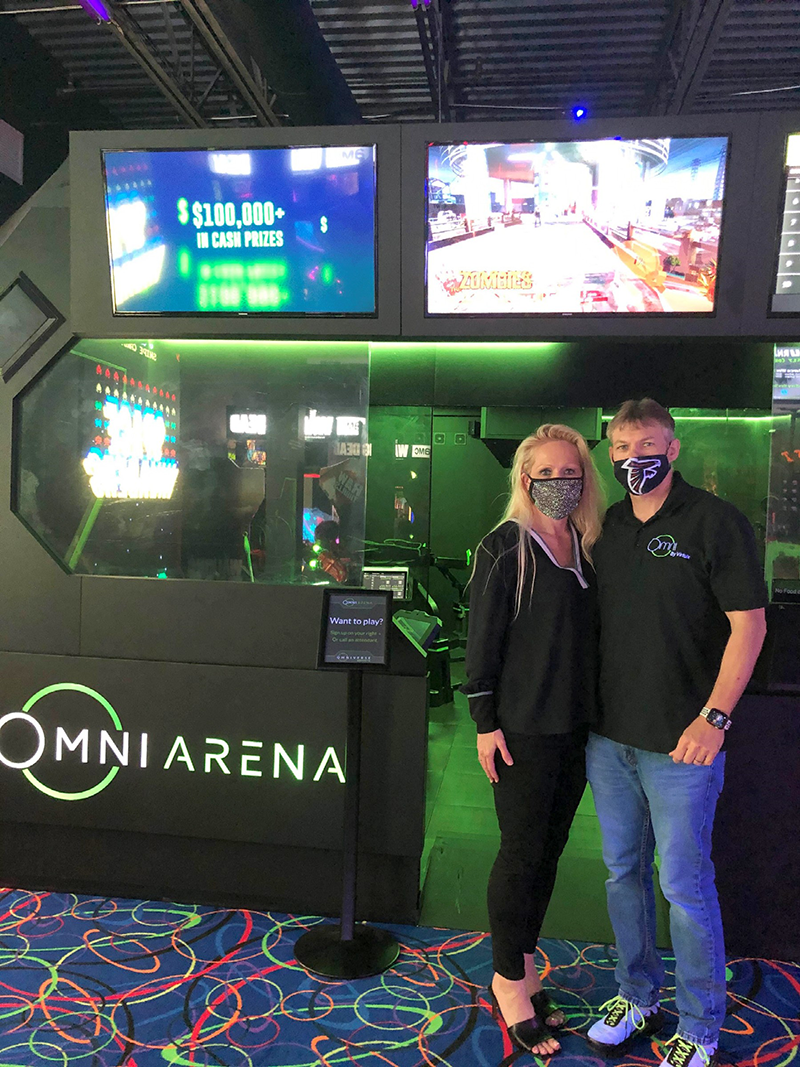Esports’ Rapid Growth Beckons FECs

Just prior to the COVID-19 pandemic, the attractions industry’s interest in esports was quickly increasing, with amusement and theme parks beginning to host significant esports tournaments. Now, that interest has reignited. For example, a few months ago, Cedar Fair announced plans to build a $28 million, 1,500-seat esports arena near Cedar Point amusement park in Sandusky, Ohio.
But it’s not just big park companies getting in on the action. In October 2021, Virtuix Inc., makers of the Omni Arena esports attraction, revealed that a TikTok video of an Omni Arena at the Cinergy family entertainment center (FEC) in Odessa, Texas, went viral and garnered more than 20 mil-lion views on the video-sharing app.
Though FECs are often smaller than amusement parks, the esports craze is a trend of which they can take advantage and rework to fit their space. Danny Gruening is vice president of marketing for Creative Works in Mooresville, Indiana, which makes a turnkey esports attraction called Game Up Esports, requiring only 20 square feet per player. He says his company installed several units at FECs in 2021, with many more in the pipeline.
“Esports is one of the fastest growing entertainment sectors in the world,” Gruening says. “Universities are giving athletic scholarships to gamers, multiple NBA franchises have their own esports teams, and viewers are watching billions of hours of esports content online. There are multiple ways FEC operators can leverage this popularity to bring guests into their venues: leagues, school programs, tournaments, viewing parties, and walk‑ins.”
He says FECs can create esports leagues and designate certain weekday nights, when FECs usually aren’t crowded, for particular games, such as “Fortnite Mondays,” “League of Legends Tuesdays,” and so forth. This allows both casual and enthusiast players to create teams and join leagues to socialize with friends while playing.
“With hundreds of universities now offering full-ride athletic scholarships for esports, a lot of high schools are creating their own teams and pro-grams,” Gruening says. “But most of these schools don’t have the space or budget to build their own training and gaming spaces. This creates an opportunity for FECs to partner with these schools to be their home field and practice locations.”
He notes that esports attractions and tournaments go hand in hand, and this can be a great way for FECs to bring guests through the door and produce income. As esports continue to grow, there will be more opportunities for FECs to generate revenue. However, Gruening cautions that this is not a “set it and forget” attraction.
“To be successful, a facility must have someone dedicated to building the programming, partnerships, tournaments, and marketing,” he says.
How One FEC Company Made Esports Work
Esports has already made significant gains at FECs in North America in particular, where Gruening estimates that by the fourth quarter of 2021, there were between 50 and 75 FECs operating “true esports lounges” with proper programming.
One FEC chain that’s made a significant commitment to esports is GameWorks, headquartered in Los Angeles. It had esports lounges operating in all seven of its locations across the United States prior to the COVID-19 pandemic lockdowns, utilizing Game Up Esports from Creative Works. The company has been able to reopen five of them, and GameWorks CEO Philip Kaplan says its commitment to esports remains strong.
“Our GameWorks esports lounge investment created a physical-location draw and the ‘hardware’ to bring players a great esports experience,” Kaplan explains. “From there, we needed to add the ‘software’ in the form of a heavy esports tournament and events calendar to activate that draw. We also launched our ‘Quick Hits Online’ esports to combine the physical and digital worlds. The online gaming served us well during COVID-19 lock-downs, as we were able to keep our players engaged while the venues were closed."
Kaplan states that esports players are passionate about the games and competition, so GameWorks tournaments, which feature both on-site attendance and online streaming, offer some of the most popular gaming titles, including “Smash Ultimate,” “Knockout City,” and “Rocket League.”
He stresses that esports lounges should have revenue-per-square-foot profitability on their own but also notes an important caveat.
“The audience activation and cross‑sell of other offerings are critical to optimizing total esports revenue,” Kaplan says. “Cross‑selling our other offerings has always been integral to our successful esports strategy. Esports drives viewership as much as game play, more so if you have exciting events and competitions in venue or globally streamed in. Gamers tend to bring friends who get hungry, thirsty, or bored and want to see what else we offer.”

Smaller FECs Can Also Reap the Benefits
For smaller FECs, finding the space for a dedicated esports lounge just might not be feasible. This was the challenge facing Scary Strokes, located in Waldorf, Maryland.
“We’re a little over 11,000 square feet,” says the facility’s CEO Doug Roth. “We’re small, and we already had mini-golf. But we really wanted another anchor attraction with cutting-edge technology that set us apart.”
So, Roth and his wife LaNeta, who is the FEC’s chief operating officer, attended IAAPA Expo 2018 and saw a virtual reality (VR) esports attraction by Virtuix called Omni. The self-contained attraction uses just 375 square feet. After the Expo, they visited Virtuix in Austin, Texas, and purchased the Omni.
“It has five or six different games, and there are weekly and monthly tournaments where winners receive prize money,” Roth says. “Our guests love it. I’d say more than half of them come here to play the Omni. 2021 is our fourth anniversary, and it will be a record year for us.”
For FECs, Roth says the key is to continue to create esports attractions that offer experiences to gamers they can’t do at home.
“You have to keep it unique so people who are gamers have a reason to come in every week,” Roth says. “For FECs, as long as the companies cre-ating these experiences provide something unique that players can do only at the FECs, then it will work, and that’s the future.”
Gruening asserts that the future of esports is bright for FECs.
“We’re still right at the beginning of the early adopters in the bell curve, but with the rate of interest growing at its current pace, we expect to see compounding growth over the next nine to 12 months.”
Factors for FECs to Consider Before Entering Esports
Funworld asked Danny Gruening, vice president of marketing for Creative Works, about the minimum requirements for FECs getting involved in esports.
What minimum square footage does an FEC need available to make an esports area worthwhile?
Most centers would want a minimum of a 20‑player setup, which would require about 350 square feet of space. This threshold usually provides enough gaming stations to host leagues, tournaments, and walk‑ins. The size can certainly go much higher, depending on how heavily a center wants to invest in esports.
What strategy should FECs employ to keep pace with the rapidly advancing esports technology?
The technology itself is obviously important. Players won’t pay to come to a center if the gaming stations aren’t top notch. Operators should invest in high-quality computers and peripherals and upgrade to high‑speed dedicated internet for their esports area.
How FECs Can Enter the Esports Realm
Philip Kaplan, CEO of GameWorks, advises FECs on strategies for planning an esports section:
“First, either commit and be all‑in like GameWorks or partner. Commitment requires a significant investment in team, training, marketing, hard-ware, and software. Just opening a center has been proven by a number of failed operators to not be enough in the absence of another player draw.
“Also, there are a number of partnership opportunities that allow operators to participate in the esports craze with a lighter investment. These have ranged from ‘BYO Device’ events, to arcade and VR offerings that include digitally connected competition features, to outsourcing esports to an events organizer. We offer a GameWorks Management Service that allows other operators to bring esports in as a turnkey feature for guests.”
